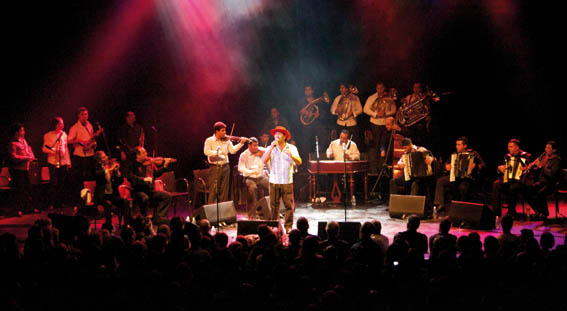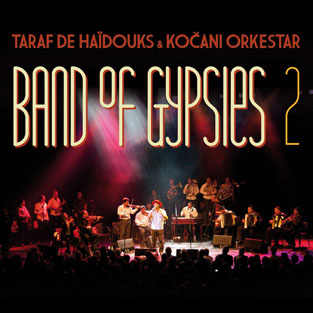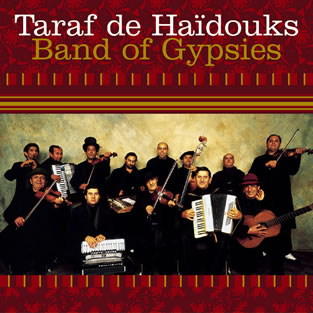
Taraf de Haïdouks and Kocani Orkestar are undoubtedly two of the most famous and emblematic Balkan Gypsy bands. Started in 1991 in the small Romanian village of Clejani, the “band of honourable brigands” (that’s the literal translation of “Taraf de Haïdouks”) is celebrating its 20th anniversary this year by launching an ambitious project: a kind of Balkan big band, in which the 13 Taraf musicians and singers are joined by the 13 members of Macedonia’s Koçani Orkestar, one of the top brass ...
R.I.P. Ilie Iorga, singer and Taraf de Haidouks mainstay
See that thin little man, standing among all these musicians who brandish their respective instruments and seem to concentrate on adopting the most attractive pose for this group picture.
He smiles broadly, and strangely holds his hand behind his ear, as if he's trying to hear, what? The photographer's flash, or his instructions? He seems happy, despite the obvious discomfort —attested by his slightly plum-coloured complexion— of being thusly dressed up, with this superb violet stanton hat chosen for him by the dresser, for the fashion show which is to take place right after the photo session. Happy, with a twinkle in his eye, yet extremely discreet. No one knows what his thoughts are at this very moment, or whether he's really conscious of being there, standing between his old friend Marin, his son-in-law Costica, and all the other members of the Taraf de Haïdouks.
This man went away forever a few days ago. He spoke until his voice and breath died away, and then raised his hand, as if he meant to signify "it's enough". He was born on the 15th of November 1928, his name was Ilie Iorga, they sometimes called him Ilie Paputsoi. A singer, a minstrel, a troubadour, recognized by all as one of the last depositaries of that treasure of ancient Romanian music: epic songs, love songs, bawdy, poetic, pastoral and sometimes even patriotic songs. This man passed through the most part of a century and its wars, upheavals and transformations, without ever losing his courtesy, his natural kindness and his gentleman-like manners: "Ca un dom", as they would say in Romanian. He spent 60 years singing his vast repertoire, and takes away with him an innumerable wealth of poetry and musical knowledge.
Always standing in a very upright posture, his slightly stiff figure gave out the impression that "life is something serious", and conferred to his ballads a solemn gravity, a sense that "this is too true to be only poetry", only to be sweetened by the modulations of his voice. Towards the end, his hearing became impaired, yet he kept singing in tune, without noticing the mischievous yet affectionate tricks played on him by his bandmates, who sometimes changed keys in order to confuse him, a tough game often played by Gypsy wedding musicians, who love to trap their peers, even in the midst of a public performance.
He loved everything —except what doesn't deserve to be loved— and never worried about his health. Now he really has no more reason to be worried, neither about himself nor about us.
S.Karo











